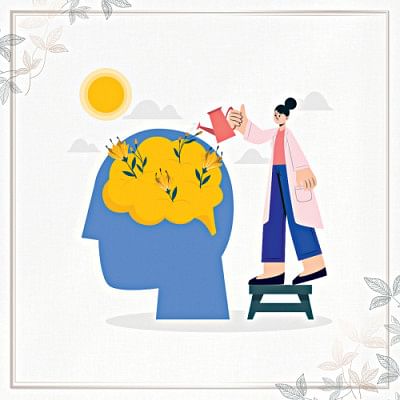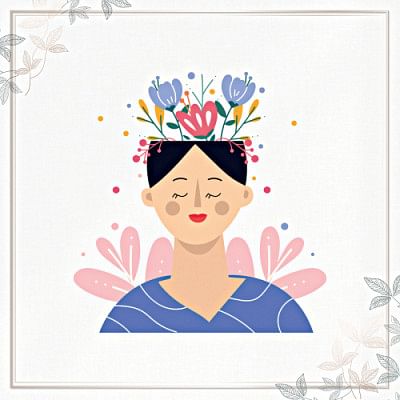Mental Health Post COVID-19

#Health & Fitness
Today, the world is quite aware and fluent on the physical symptoms of COVID-19, largely publicised by the CDC (Centers for Disease Control and Prevention) and WHO (World Health Organization). From fever and chills to blue coloured lips and persistent pressures in the chest, the symptoms are varied and extensive. However, psychologists globally have one more symptom to add to the list, which we may have frisked-over in haste: mental distress post-COVID.
Shamima Akter, Psychological Counsellor, PHWC Dhaka, (Psychological Health and Wellness Centre Dhaka), agrees.
"COVID-19 brings with it an associated list of trauma, from losing loved ones, to suffering from chronic fatigue because of the disease itself — all these conditions have a huge impact on one's psychological health. It's not uncommon to hear people complain that they feel lethargic after suffering from COVID-19 and somehow seem to have lost interest in doing things they once used to enjoy."
"We have had a sizeable number of patients with triggered mental health ailments seeking help, post-COVID. In most cases, the psychological disorders were mild, borderline or dormant pre-pandemic, and got triggered later after the spread of the disease," revealed the counsellor.
Hasnat Imam, a COVID survivor enlightens us with his experience.
"COVID has ruined our (my family's) lives unlike anything in the world. I have lost both my parents to the pandemic, that too within a span of 6 months. I have suffered from the disease myself and somehow have never been able to get back to my pre-pandemic health condition till today.
"Before COVID, I used to love going to clubs, social gatherings, and parties. Today, I am a completely different man. Parties do not excite me anymore, in fact, the very idea scares me and I prefer staying away from meetings, crowds or any sort of get-togethers. Some say I have become a recluse, but I can't help it. I just don't feel hip anymore," said Imam.
We also spoke to Shamima Jahan, a struggling entrepreneur, who used to have a thriving Jamdani store at one of Dhaka's most prominent shopping malls. Two years of the contagious disease, associated lockdowns and escalating costs forced her to close her shop and seek financial help elsewhere. Today, she feels depressed and hopeless about her future, especially with two young children to look after; she feels like all the weight of the world is on her shoulders.

"I don't really know what to do anymore. I feel upset all day, angered, anxious and agitated. I do not think my children deserve such a hostile environment to grow up in," shared Jahan.
Thankfully, Shamima Akter, psychologist at PHWC, was familiar with both the symptoms and had worthy suggestions.
"These are typical symptoms. So many people have been traumatised by the pandemic. Some have lost their loved ones, others have lost their jobs, and businesses. The first and foremost action that we suggest as counsellor is to be able to recognise the existence of an unwanted mental health condition impairing our regular lives. The rest becomes easier," she said.
The practitioner also added, "Next, we help the victims recognise that the unfortunate circumstance was purely an act of nature, where they couldn't have done anything to change the situation. We teach the sufferers to stop blaming themselves for the pandemic and its aftermath. We then encourage them to live in the present, rather than in the past or worry about the future. We provide them with tools to improve their mental clarity and find ways to improve their lives."
Sajed Huq and Mariam Noor-Huq revealed having a complicated marital relationship during COVID times.
"The pandemic forced us to stay together 24/7, our tense and agitated personalities clashed so much that we had to seek out a marriage counsellor at PHWC," said Noor.

Snigdha Sarwar, a dentist by profession, revealed that her 3-year-old became aggressive and hostile during the pandemic.
"I did not notice these symptoms even last year. The psychological counsellor we consult said, my son's ADHD has been triggered because of increased screen-time during the pandemic," said Sarwar.
These and countless other similar stories, tell us the extreme importance of psychological health, especially after a global disorder like the pandemic. We, as a nation, since time immemorial have considered psychological conditions as a subject-matter not worth discussing. We have stigmatised victims of mental health disorders and we have refrained from showing any sort of sympathy. In any normal condition, statistics show that at least 17 percent of the population of Bangladesh suffer from some kind of mental disorder, and the pandemic has perhaps escalated the problem. Given the circumstances, if we continue to undermine mental health and well-being, things will only get worse, affecting our social and economic conditions.
It's about time we learned to give value to mental health and hold it equally valuable as physical health. It's about time we sought professionals to discuss our problems and find solutions with them.
Creatives: TurnUp Pr
Special Thanks to PHWC for enlightening us on the subject matter
Names of patients have been changed to maintain privacy.

 For all latest news, follow The Daily Star's Google News channel.
For all latest news, follow The Daily Star's Google News channel. 



Comments